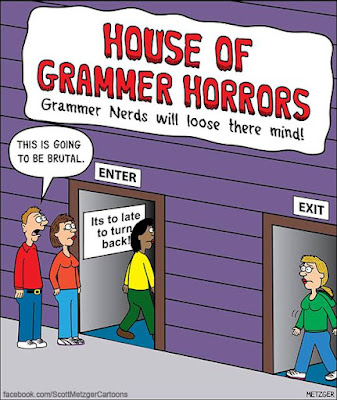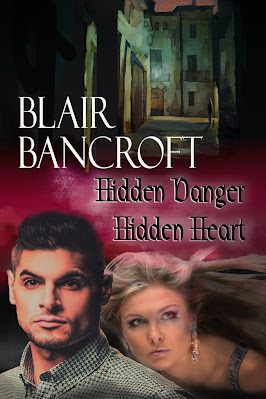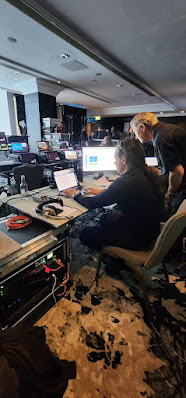This week's Gallery starts with a true eye-opener, a "would you believe" for all my readers who have watched my grandgirls grow since they were toddlers . . .
The girls' parents just spent 10 days in Europe - part vacation, visiting Mike's cousin in Spain - but essentially due to Mike running tech for a big convention in London. Below, behind-the-big-screen pics of what Susie dubbed, "Mission Control."
And from Facebook . . .
 |
If anyone knows if this truly exists & where . . .
|
Don't miss this one! Sent by my politically like-minded son in Connecticut.
The quote that went with it:
"She got quite a bump on the head.
We kinda thought there for a minute she was gonna leave us."
~ * ~
WHY I ENJOY EDITING
As most of my readers know, I retired from giving advice on Writing and Editing after publishing a compilation of all my "how to" blogs since 2011 under the title Making Magic With Words. But every once in a while I feel the need to keep my hand in, so as I edited Chapter 14 of my latest Regency Gothic, Menace at Lincourt Manor, I was inspired to dust off my editing advice column and say a few new words.
"Editing is torture. Why would anyone enjoy editing?"
I suspect the majority of authors would agree with the above. I do not. I not only like it; it gives me great satisfaction. "Why?" you ask . . .
1. First and foremost, it gives me a chance to "see what I've got." Do my words make sense? Are they strong enough to keep a reader's attention? Does the chapter pass muster, even though it needs work?
2. Secondly, editing gives me an opportunity to add all the things I left out in my rush to move the action forward.
Grace note: although my editing almost always consists of additions, other authors might find they need to make deletions. Never forget that author styles of writing are as diverse as snowflakes.
What are some of the many things I look for while editing?
1. Missing descriptions (both background and people), bad transitions—did I make a leap too far from one paragraph to the next?
2. Major plot point flubbed—a hint too vague; perhaps too much, too soon; or no set-up at all for a major event to come
3. Those old bugaboos—typos, words left out, repetitive words, a sentence that simply does not say what you thought it said.
4. The sudden need to name a character who was simply "a friend, a maid, an acquaintance," but you realize the story would be better if this person were not completely anonymous.
I could go on and on, but I absolutely love to pounce on my omissions and find a way to make my story more vivid, more colorful, more understandable.
How should you go about editing?
Again, the answer to this is as varied as the number of authors currently struggling over their manuscripts. As far as I am concerned, until somewhere around Edit Four, I edit hardcopy. For me, having an 8½ x 11 page in front of me makes sense. I can scribble changes in pencil, erase them just as fast as something better comes to mind. I can scrawl long inserts in pen on a legal pad, crossing out 2 or 3 versions perhaps before I find the exactly right words. (If editing on screen, such major changes can easily become confusing.)
Yes, I have to type in these edits at a later date, but it couldn't slow me down very much if I'm currently working on Book 52!
[As stated in previous blogs, my style - not necessarily yours - is to edit after every chapter, again after every 5 chapters. A 3rd edit, starting from the top; a 4th, and hopefully final, edit online after converting my Word Perfect draft to Microsoft Word.] Don't groan! Only a few authors manage to get satisfactory copy from anything less.
For the novices among my readers . . .
Do not forget to run Spell Check! But do NOT depend on it. It will not find the word you skipped, the word you typed by accident, the phrase you accidentally deleted. Only careful reading of your work will help you avoid catastrophic mistakes. (And yes, even after four or five edits, I still have typos in my work, I admit it. I found somewhere around nine when proofreading the paperback copy of The Secrets of Stonebridge Castle. Believe me, none of us is perfect!)
It's been a long while since I tried the technique below. Using the first draft of Chapter 14 of Menace at Lincourt Manor as an example, here is an excerpt from page one with the additions indicated in red. Deletions, an unusually high number for me, are listed below the excerpt.
Chapter 14
I would like to record that my visits to the farms and dairy were a grand success, establishing a comfortable rapport between the Manor and our tenants. Truth was, whatever good impression Julian and I might have made on our initial visit had been seriously eclipsed by the odd manner in which I had located Betsy. And now, despite my attempt to play gracious-lady-of-the-manor, I had the feeling that the moment my back was turned every hand would be contorted into the “keep away, evil-witch” gesture Lottie had shown me.
There was little I could do but hold my head high, keep a smile on my face, and hope time would lay the matter to rest. With determination in my soul and hope in my heart, I returned to list-making; this time, a compilation of the names of all our tenants, their children and employees. I would become a proper chatelaine for Lincourt Manor! When I had doubts about managing the role of chatelaine, I consoled myself with recollections of tales about Medieval ladies who held their domains for years on end while their husbands were on crusade. Then again, whispered that niggling voice in my head, I doubted any of them had a staff who thought the lady of the house a witch or put dishes of smoldering sage in the main rooms of their castles.
I received a hasty scrawl from Julian: Violet, you disappeared without a word. Explain, if you please.
Deletions to the above paragraphs:
I would be fortunate; the role of; alleviated even a small modicum of their wariness; even Betsy, after once again expressing her abject gratitude, contorted her hand; Nonetheless, I was back to list-making; What happened?
Grace note: it was the extent of the edits in these opening paragraphs that prompted me to write this blog. Even after all my years of experience, "it ain't easy."
Summary: If you are not editing multiple times, you are headed for an amateur presentation. Concede you are not Nora Roberts, Lindsay Buroker, Jeff Wheeler or any other of the handful of authors who appear to churn out words with nary a stutter. READ your work, make it better. REPEAT as often as necessary to make it sing. Or at least be the best you can do at this stage of your career. DO NOT insult your readers by giving them pages tossed off in haste, pages you believe to be so "perfect" you cannot possibly make them better. Cuz for 99.999 percent of us, it just ain't so!
Go forth, write, then edit the @#$% manuscript!
~ * ~
For a link to Blair's website, click here.
For a link to Blair's Facebook Author Page click here.
Thanks for stopping by,
Grace (Blair Bancroft)






































